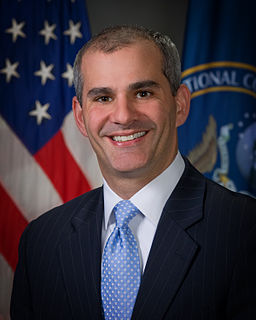A Quote by Barack Obama
In terms of my conversations with [Vladimir] Putin, these are conversations that took place before the election. As I indicated, there has been very clear proof that they have engaged in cyber attacks. This isn't new. It's not unique to Russia. There are a number of states where we've seen low-level cyber attacks and industrial espionage and, you know, other behavior that we think should be out of bounds.
Related Quotes
We do know from our intelligence community that Russia had a design to discredit the U.S. elections, and took sides in favor of Mr. Donald Trump over Hillary Clinton. We do now that they engaged individuals and entities to do cyber-attacks to get as much information as they possibly could, and of course, also used WikiLeaks to accumulate information, and released it in a strategic way that could affect our election, and certainly the credibility of our election.
It ends a 40-year ban on exporting U.S. oil. It's changed - it's included in its cyber-security legislation - that says to private companies, hey, if you share with us your data on your cyber-attacks, your potential cyber-attacks, we'll give you liability protection. And they authorized a health care program for 9/11 responders for 75 years to cover the length of their lifespans.
We need to make sure that whenever we're engaging in a cyber-warfare campaign, a cyber-espionage campaign in the United States, that we understand the word cyber is used as a euphemism for the internet, because the American public would not be excited to hear that we're doing internet warfare campaigns, internet espionage campaigns, because we realize that we ourselves are impacted by it.
The attack on the law firms and attacks like that are industrial espionage, searching for copyrighted materials to lift and so on; it's not quite the same as cyber-warfare. They are regarded as related. The Chinese are trying to steal an economic march on the West, which is a consequence of the fact that we outsourced all of our manufacturing to China in the 1990s.
What we need to do is we need to create new international standards of behavior - not just national laws, because this is a global problem. We can't just fix it in the United States, because there are other countries that don't follow U.S. laws. We have to create international standards that say that cyber attacks should only ever occur when it is absolutely necessary.





























